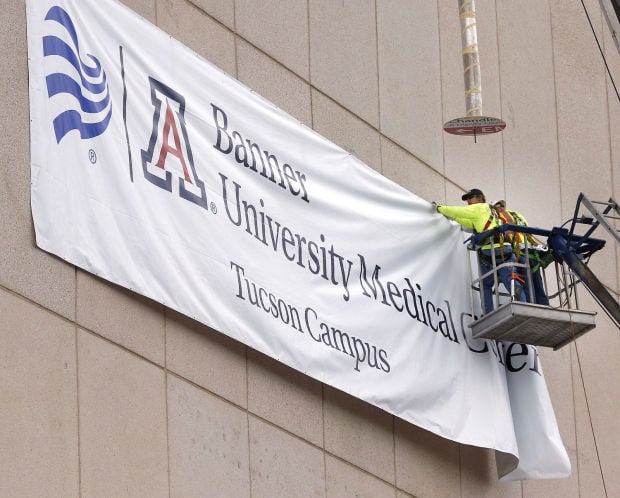At midnight Friday, a merger between the Tucson-based University of Arizona Health Network and Phoenix-based Banner Health took effect.
While officials call the transaction a merger, Banner Health is the surviving entity.
Here are five key facts to know about the Banner deal and how it affects Tucson residents:
1 Two local hospitals are getting new names.
There’s a generation of Tucsonans that might always refer to the hospitals as UMC and Kino, but both have new names:
- The UA Medical Center-University Campus (formerly known as University Medical Center or UMC) at 1501 N. Campbell Ave. is now called Banner-University Medical Center Tucson.
- The UA Medical Center-South Campus (formerly known as Kino Hospital) at 2800 E. Ajo Way, is now called Banner-University Medical Center South.
2 Banner-University Medical Center Tucson is getting rebuilt.
Banner officials expect to upgrade and expand the hospital at 1501 N. Campbell Ave, just south of East Elm Street. The original building went up in 1971.
The construction project will preserve a recent expansion that included building a new Diamond Children’s wing. But the company plans to build a new tower on property immediately west of the current building. Banner has already spoken to neighbors about an 11-story building.
Officials expect to begin the three-year project in 2016 and when it’s complete, “it will feel like a new hospital,” they say. The project could cost $500 million or more, officials estimate.
3 The nonprofit UA Health Network no longer exists.
The $1.2 billion nonprofit UA Health Network, which included two hospitals, three health-insurance plans, numerous clinics and the University Physicians Healthcare physician plan, is now a part of the larger nonprofit Banner system, which includes medical centers in seven states.
4 Banner Health is now the largest private employer in Arizona.
The merger takes Banner Health to about 38,500 employees in Arizona. The next largest private employer in Arizona is Walmart. The former UA Health Network included about 6,500 workers. Those workers are guaranteed to keep their jobs for at least six months post-merger.
5 The merger is part of a national trend of hospital consolidation.
Connecticut-based Irving Levin Associates Inc. says the number of hospitals and hospital beds involved in mergers and acquisition transactions hit a five-year high in 2014.
The Banner transaction leaves the nonprofit Tucson Medical Center as the only non-government acute-care community hospital in the Tucson area that is both locally and independently owned. Northwest Medical Center, Oro Valley Hospital, Carondelet St. Mary’s and Carondelet St. Joseph’s are all owned by out-of-town corporations and are part of larger systems.
Officials with the not-for-profit Missouri-based Ascension, which owns the local Carondelet hospitals, are negotiating a deal to change ownership. The deal would switch 60 percent of the Tucson-based nonprofit Carondelet Health Network’s ownership to Texas-based for-profit Tenet Healthcare Corp., an Oct. 15 bond offering from California-based nonprofit Dignity Health says.
The bond offering also says that 20 percent each would be owned by Dignity Health and Ascension.





